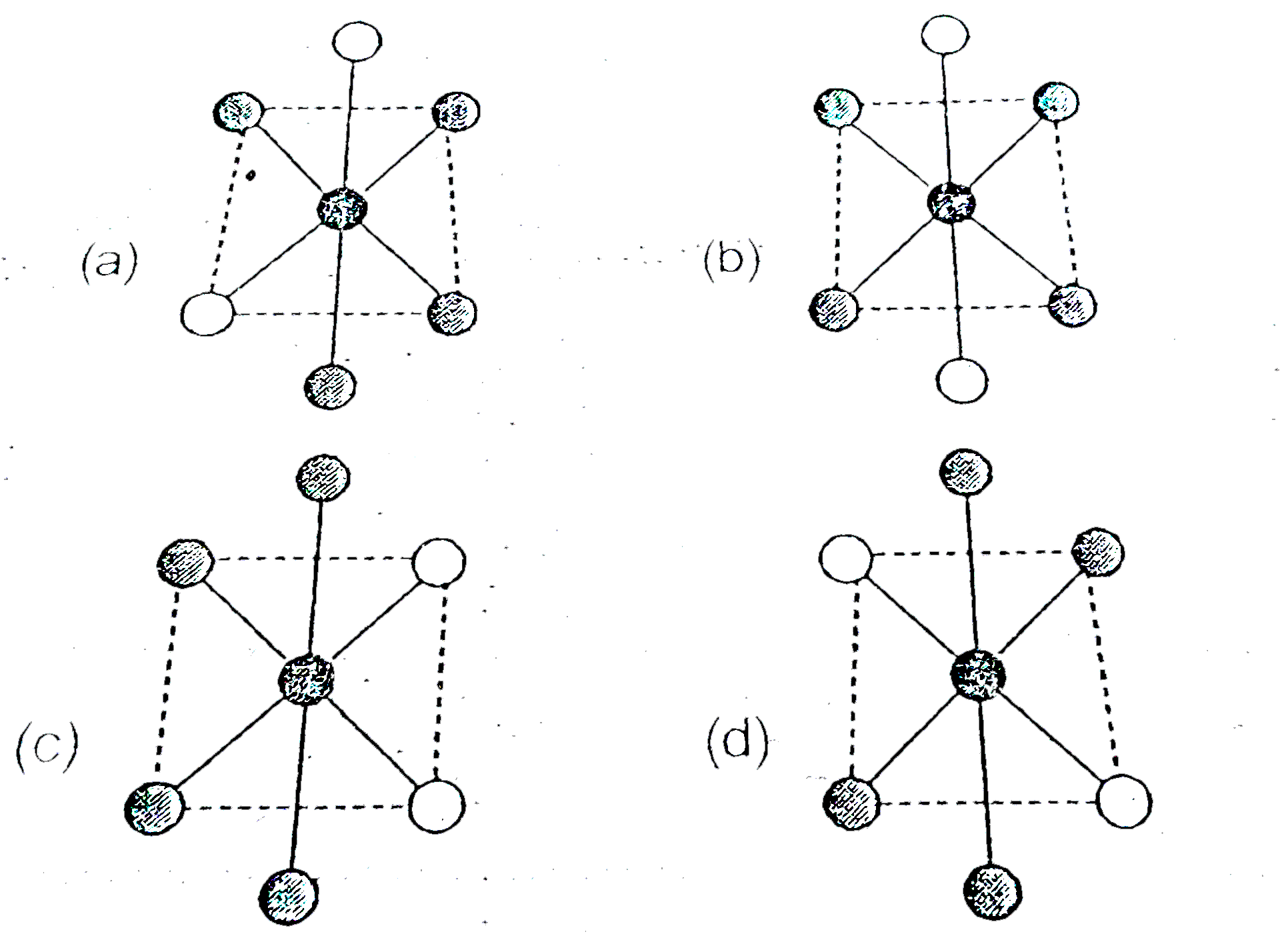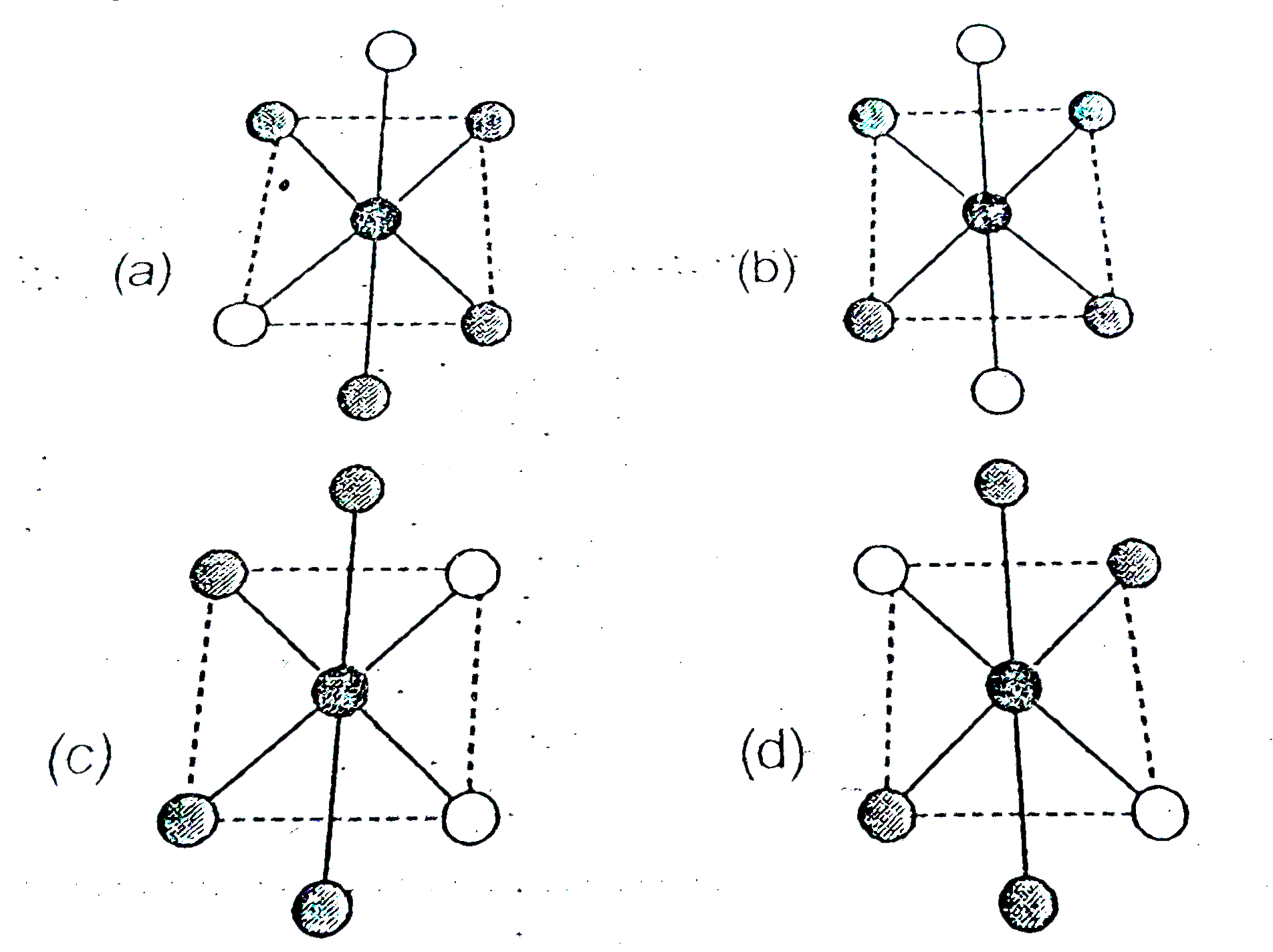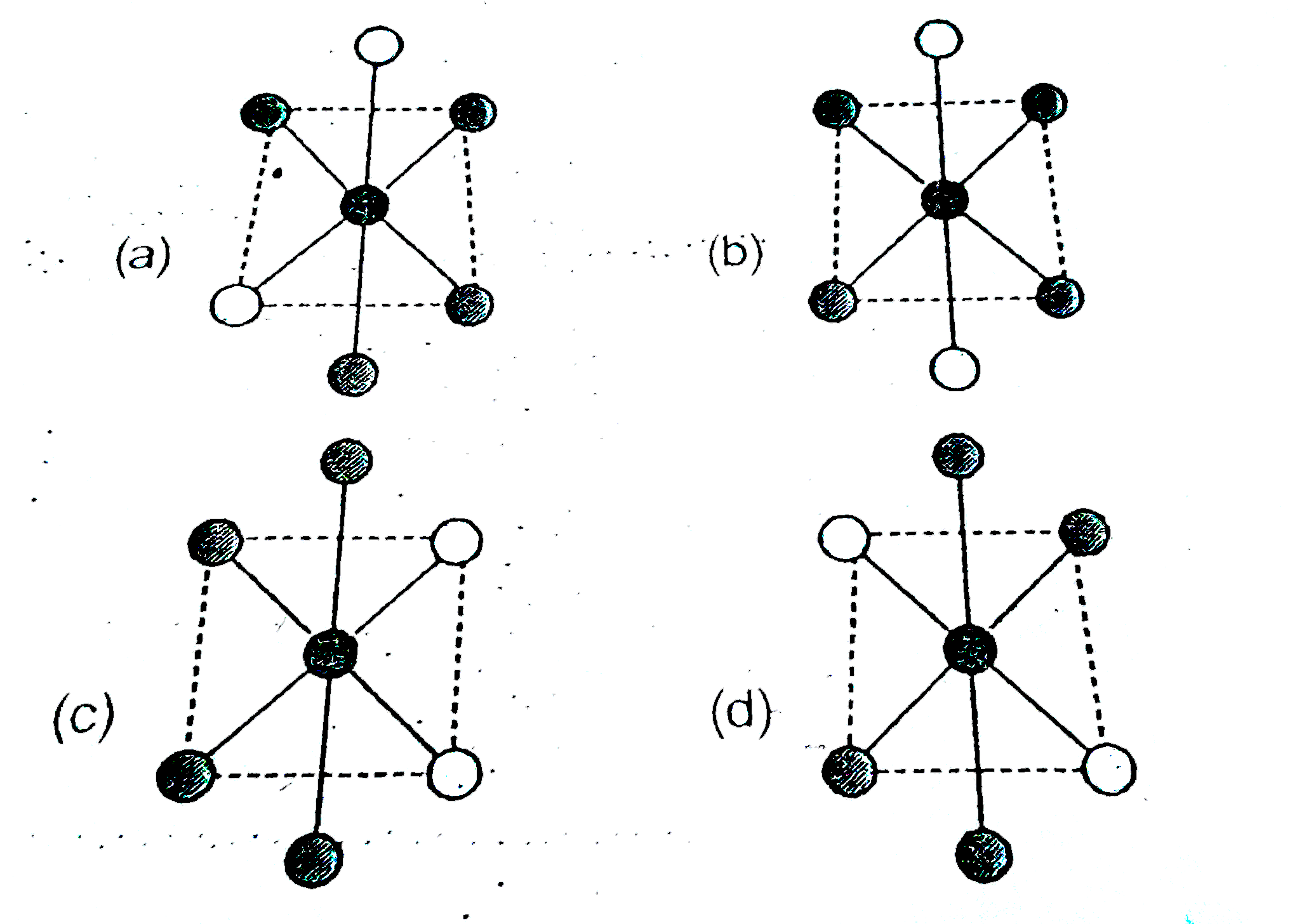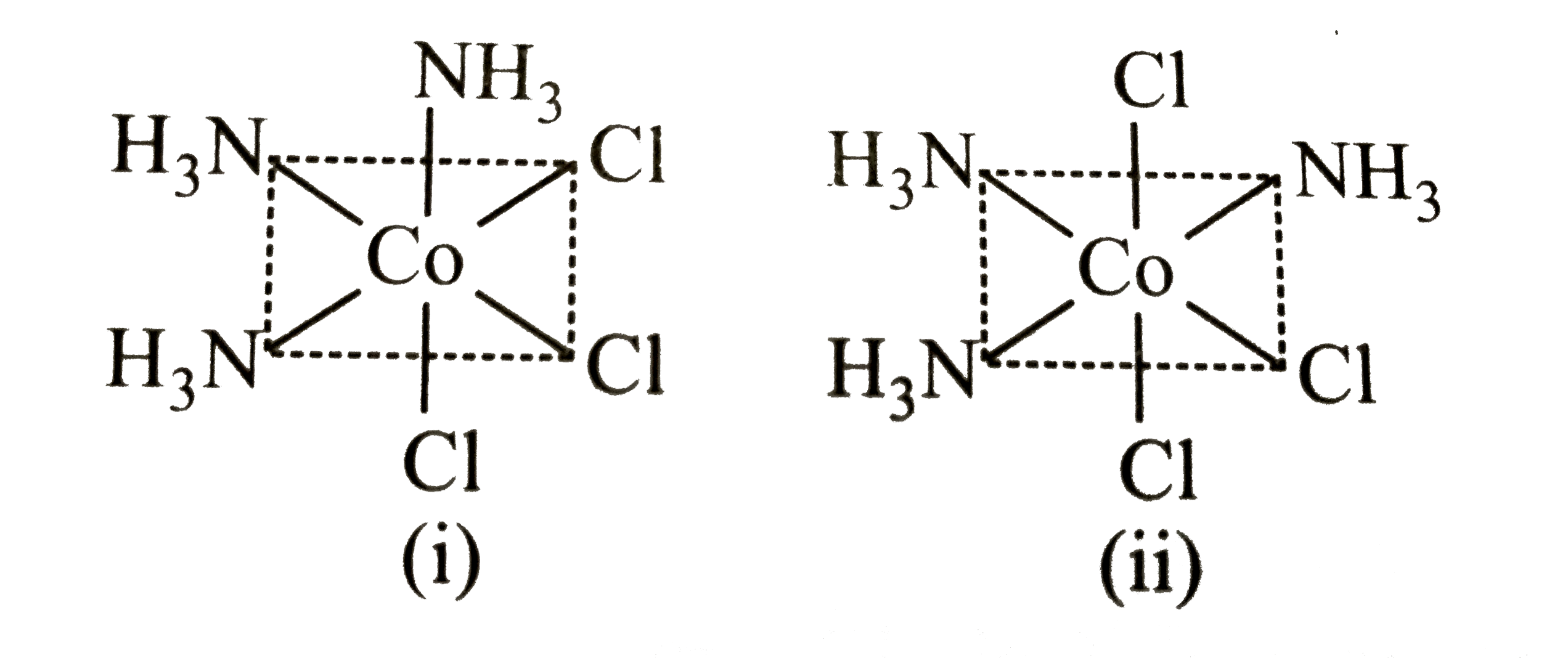The formula Co(NH3)4 CO3 Br represents three isomers
Draw their structures
To solve the problem of drawing the structures of the three isomers of the coordination compound Co(NH₃)₄CO₃Br, we will follow these steps:
Step 1: Identify the Components
The coordination compound consists of:
- Cobalt (Co) as the central metal ion
- Four ammonia (NH₃) ligands
- One carbonate (CO₃) ligand
- One bromide (Br) ion
Step 2: Determine the Types of Isomers
The isomers can be classified into two main types:
1. Geometric Isomers (cis and trans)
2. Ionic Isomers
Step 3: Draw the Geometric Isomers
a) Trans Isomer
1. Place cobalt (Co) at the center.
2. Position the four NH₃ ligands around the cobalt such that two NH₃ are opposite to each other.
3. Position the CO₃ ligand and Br ion opposite to each other.
Structure:
NH3|NH3−Co−CO3|Br
b) Cis Isomer
1. Again, place cobalt (Co) at the center.
2. Position the four NH₃ ligands such that two NH₃ are adjacent to each other.
3. Position the CO₃ ligand and Br ion adjacent to each other as well.
Structure:
NH3|NH3−Co−Br|CO3
Step 4: Draw the Ionic Isomer
1. Place cobalt (Co) at the center.
2. Position the four NH₃ ligands around the cobalt.
3. Attach the CO₃ ligand through its two oxygen atoms.
4. The Br ion will be outside the coordination sphere, indicating an ionic interaction.
Structure:
NH3|NH3−Co−NH3|CO3∣Br⁻
Summary of Structures
1. Trans Isomer: NH₃ ligands are opposite to each other, with CO₃ and Br opposite.
2. Cis Isomer: NH₃ ligands are adjacent, with CO₃ and Br adjacent.
3. Ionic Isomer: CO₃ is coordinated through oxygen, with Br outside the coordination sphere.
The coordination compound consists of:
- Cobalt (Co) as the central metal ion
- Four ammonia (NH₃) ligands
- One carbonate (CO₃) ligand
- One bromide (Br) ion
The isomers can be classified into two main types:
1. Geometric Isomers (cis and trans)
2. Ionic Isomers
a) Trans Isomer
1. Place cobalt (Co) at the center.
2. Position the four NH₃ ligands around the cobalt such that two NH₃ are opposite to each other.
3. Position the CO₃ ligand and Br ion opposite to each other.
NH3|NH3−Co−CO3|Br
1. Again, place cobalt (Co) at the center.
2. Position the four NH₃ ligands such that two NH₃ are adjacent to each other.
3. Position the CO₃ ligand and Br ion adjacent to each other as well.
NH3|NH3−Co−Br|CO3
1. Place cobalt (Co) at the center.
2. Position the four NH₃ ligands around the cobalt.
3. Attach the CO₃ ligand through its two oxygen atoms.
4. The Br ion will be outside the coordination sphere, indicating an ionic interaction.
NH3|NH3−Co−NH3|CO3∣Br⁻
1. Trans Isomer: NH₃ ligands are opposite to each other, with CO₃ and Br opposite.
2. Cis Isomer: NH₃ ligands are adjacent, with CO₃ and Br adjacent.
3. Ionic Isomer: CO₃ is coordinated through oxygen, with Br outside the coordination sphere.
Topper's Solved these Questions
- COORDINATION COMPOUNDSBOOK - CENGAGE CHEMISTRY ENGLISHCHAPTER - COORDINATION COMPOUNDSEXERCISE - Ex 7.1 Subjective (Terminology)
5 Videos
- COORDINATION COMPOUNDSBOOK - CENGAGE CHEMISTRY ENGLISHCHAPTER - COORDINATION COMPOUNDSEXERCISE - Ex 7.1 Subjective (Effective Atomic Number (Ean))
3 Videos
- COORDINATION COMPOUNDSBOOK - CENGAGE CHEMISTRY ENGLISHCHAPTER - COORDINATION COMPOUNDSEXERCISE - Archives Subjective
18 Videos
- CHEMICAL KINETICSBOOK - CENGAGE CHEMISTRY ENGLISHCHAPTER - CHEMICAL KINETICSEXERCISE - Archives Subjective
23 Videos
- D AND F BLOCK ELEMENTSBOOK - CENGAGE CHEMISTRY ENGLISHCHAPTER - D AND F BLOCK ELEMENTSEXERCISE - Archives Subjective
29 Videos
Similar Questions
Draw structure NH4OCN
View SolutionTwo complexes with empirical formula Co(NH3)3(H2O)2Br2Cl exists in two isomeric forms (A) and (B). Form A gives two moles of AgBr on treatment with AgNO3 solution whereas form B gives only one mole of AgBr. Give the structural formula of both these isomers. What are these isomer called?
View SolutionConsider the following isomers of [Co(NH3)4Br2]+ . The black sphere represent Co, grey spheres represent NH3 and unshaded spheres represent Br.

Which structures are identical
View SolutionConsider the following isomers of [Co(NH3)4Br2]+ . The black sphere represent Co, grey spheres represent NH3 and unshaded spheres represent Br.

Which of the following are trans-isomers ?
View SolutionConsider the following isomers of [Co(NH3)4Br2]+ . The black sphere represent Co, grey spheres represent NH3 and unshaded spheres represent Br.

Which of the following are cis-isomers ?
View SolutionTwo isomers of a compound Co(NH3)3Cl3(MA3B3 type ) are shown in the figures .

The isomers can be classified as
View SolutionWhich of the following complexes can exists as enantiomers ? Draw their structures
(a)cis−[Co(NH3)4Br2]+ (b)cis−[Cr(H2O)2(en)2]3+ (c)[Cr(gly)3]
(d)[Cr(en)3]3+ (e)cis−[Co(NH3)Cl(en)2]2+ (f)trans−[Co(NH3)2(en)2]2+
View SolutionDraw the structural formulae of all the possible isomers of the compound with the molecular formulae C3H6O and also give their electron dot structures
View SolutionNa2CO3 cannot be used in place of (NH4)2CO3 for the precipitation of group V because
View SolutionDraw the possible isomers of the compound with molecular formula C3H6O and also give their electron dot structures.
View Solution
